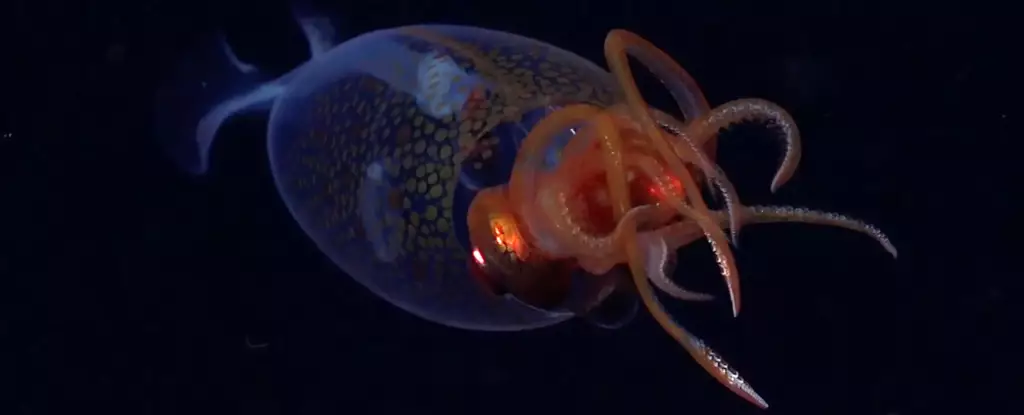In the dark, frigid waters of the Antarctic, a mysterious giant has remained a ghostly enigma for centuries. The colossal squid, a creature that has haunted the imaginations of sailors and scientists alike, has recently captured our attention like never before. For decades, this remarkable being has existed just beneath the surface of our understanding, and its recent sighting marks a triumph not only for scientific exploration but also for our curiosity as a species. This startling revelation begs us to consider how little we truly know about our planet’s oceans and, in many ways, what lurks beneath them.
As modern civilization continues to expand its reach into virtually every corner of the globe, it is essential to remember that there remain vast repositories of untapped mystery buried beneath the waves. The colossal squid, previously an elusive figment of lore compared only with its slightly less-mysterious cousin, the giant squid, exemplifies both the awe and frustration of human exploration. What does it say about our obsession for disclosure of the natural world? The revelation of an actual living colossal squid forces us to confront the uncomfortable truth that the ocean’s depths still hold secrets that challenge the limits of our knowledge and technology.
From Myth to Reality: The Colossal Squid in Focus
Recent footage captured by the remotely operated vehicle, SuBastian, represents more than just an entertaining spectacle; it is a testament to human ingenuity and the relentless pursuit of knowledge. Emergent from this revelation is the stirring story of exploration itself. The image of a solitary, juvenile colossal squid, emerging from the darkness, serves as a stark reminder of the vastness of our oceans and the unseen life thriving within them. At over 23 feet in length and weighing up to 1,100 pounds, the colossal squid truly shatters our preconceived notions of marine life. These estimates, however, might be insufficient, as just last March, researchers observed a baby squid barely a foot long in its natural habitat, reminding us not only of its staggering size potential but also of the fragility of these extraordinary beings.
The footage, an essential artifact of marine research, was procured during the Ocean Census, an ambitious project dedicated to discovering new marine life. It signifies a sea change in our understanding of the depths where such creatures reside. The fact that researchers had only recorded dying specimens before this event further emphasizes the achievement of this expedition. The irrefutable evidence captured on camera serves not only as confirmation of the squid’s existence but also as additional fuel for ongoing debates surrounding oceanic conservation, biodiversity, and the importance of continued exploration.
Delving into the Deep: Scientifically Outrageous Features
As we dive deeper into the anatomical wonders of the colossal squid, it becomes clear that this creature is equipped with jaw-dropping features unlike any known to humankind. With rotating hooks on its tentacles and the largest eyes of any animal, these adaptations illustrate not only the beauty of evolution but also nature’s ingenuity in response to its own challenges. The colossal squid has evolved in a way that allows it to thrive in the dark and treacherous depths, raising questions about intelligence and adaptability within marine life.
This raises a monumental point: If a creature as elusive as the colossal squid can evolve to dominate its habitat, what else lies undiscovered in the expanses of our oceans? The layers of marine life remain astonishingly broad and intricately connected. The potential for discoveries of new species and understanding related ecosystems could augment our environmental outlook and appreciation for the oceanic character on our planet.
A Call to Action: Advocating for the Ocean Depths
The revelation of the colossal squid should not be met merely with wonder and excitement; rather, it serves as an urgent wake-up call to recognize and address the problems threatening our oceans. As climate change and human activity inexorably transform marine ecosystems, we must acknowledge that cephalopods and myriad other life forms could be lost before they are fully understood. The marine world deserves protection and respect, demanding a collective response from both scientists and citizens alike to safeguard the wonders of our blue planet.
In a world often defined by division, the discovery of this magnificent creature invites a collaborative spirit into marine research and conservation. Above all, the colossal squid stands as an icon of nature’s hidden majesty, symbolizing the incredible possibilities that arise when we choose to invest our efforts into preserving the mysteries of the oceans for future generations.


Leave a Reply